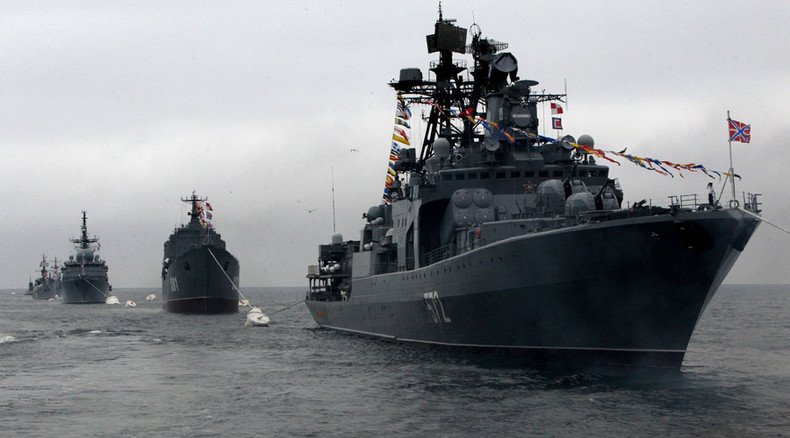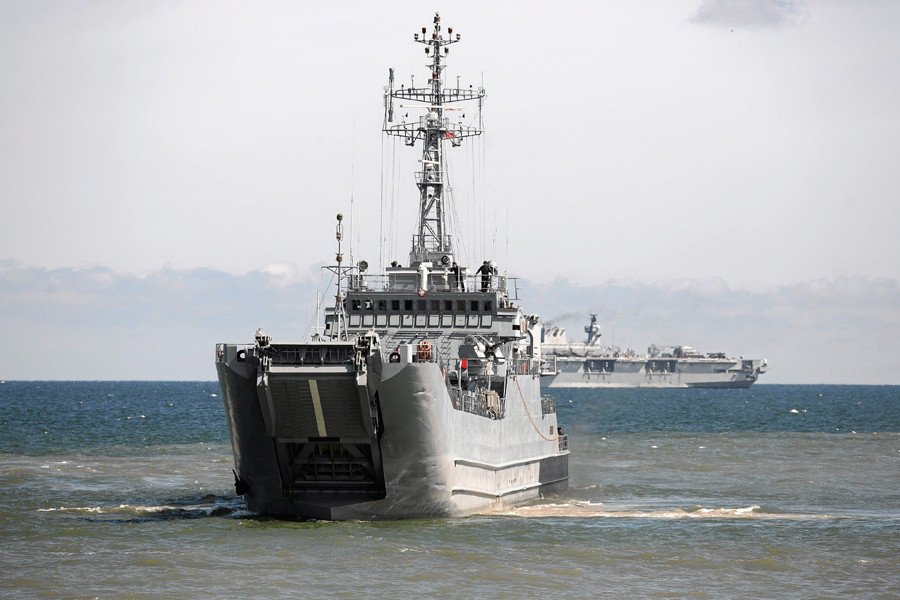‘Russia’s Maritime doctrine – counter-measure to NATO’s climbing escalation ladder’

The US is clearly escalating its aggression against Russia, but it’s Russia that is portrayed as the aggressor. This is nothing but an ‘Alice in Wonderland’ propaganda operation by the American government, says Brian Becker from the Answer coalition.
Russia has published a new maritime strategy laying out the future of the country's naval activities. The adoption of the new naval code focusing on Russia’s naval presence in Crimea and the Arctic has sparked a reaction in Western media worried it could be a show of aggression.
READ MORE: Russia’s new maritime doctrine ‘to counter NATO’s expansion’, focuses on Crimea & Arctic
RT: Russia's boosting its position in the Atlantic - what kind of signal does that send to NATO?
Brian Becker: The Russian government’s announcement that it is upgrading its naval capability in the Atlantic Ocean, in the Atlantic theater, is a clear response to the announcement by the Pentagon and the new US military doctrine updated since 2011 which now identifies Russia as the leading threat to the US. This updated military doctrine - which I should say is an operational doctrine - coincides with large scale NATO - that is US-led - military maneuvers including a large numbers of warplanes, tanks, heavy artillery and naval vessels close by to Russia and its Western borders and its Western waters. So it’s a predictable response by the Russia government of what is obviously perceived, and is in fact, a real threat to Russia’s own national interests in the Russian area.
RT: The doctrine specifically mentions NATO's expansion as a reason to strengthen its positions. How justified are Russia's concerns?
BB: Yes, of course, it’s a counter measure by the Russian government and the Russian Navy in its Western area in the Atlantic Ocean as a consequence of the upgrade by the US of its recent military doctrine of Russia as its primary threat in the world…This upgrade, this new assessment, new military doctrine by the US coincides with large scale military exercises by NATO and US forces on Russia’s Western borders. Clearly this is a counter measure because the Russian government perceives that NATO has climbed the escalation ladder.

RT: Is Russia justified in aiming to restore and secure its positions in the Atlantic, Mediterranean, and the Baltic?
BB: This is a doctrine of self-defense, the Russian government stated so. They are not carrying out large scale military maneuvers on US borders, on the Mexican border, Canadian border or in the Atlantic Ocean of the coast of Long Island. This is designed by the Russian government as a self-defense measure and of course American military propaganda paints the Russian military actions, or announced military plans as aggression, and everything the US does is designed in terms of the propaganda for self-defense of the countries in the Eastern and Central Europe or those who border Russia. So we have sort of an ‘Alice in Wonderland’ propaganda operation by the American government which is clearly escalating its own aggression against Russia, and when Russia moves to defend itself it’s portrayed as the aggressor. But of course this is nothing but propaganda.
RT: The initial reaction seems to be that this is a show of aggression from Russia. Is there another way to read this doctrine?
BB: No, I don’t think so. Russia is a major power; it’s the largest landmass in the world. Big parts of the country are in fact landlocked. Russia has been the victim of aggression in the WWII, 27 million Soviet people died. Right after that the Western powers regrouped in NATO starting in 1948 and carried out military exercises including simulated nuclear destruction of the Soviet Union and later Russia. So it’s hard to think of the Russian government as being provocative. They have a clear historical need for defense because their country, unlike the US, has been invaded and victimized unlike any country in the world.
RT: Another major priority is the energy rich Arctic region - somewhere a lot of countries lay claim to. Will the Russian position be heard?
BB: The Arctic is a point of extreme confrontation in the coming decades. The US is orientating a big part of its military operations towards the Arctic; as the Arctic thaws as new perhaps limitless or seemingly limitless energy resources become available because of this tragedy of the global melting in the Arctic. Nonetheless, that will be a point of confrontation for resources. The US is an Arctic power because of its acquisition of Alaska; Canada is clearly an Arctic nation. In other words, NATO is now focusing through its bigger countries on preparations for the Arctic. Of course Russia as an Arctic power will do the same. And China - even though it’s not an Arctic power per se - will also follow suit. I think all the major powers in the world will start to orient militarily towards the Arctic and that means that each will try to upgrade its military readiness.
The statements, views and opinions expressed in this column are solely those of the author and do not necessarily represent those of RT.
The statements, views and opinions expressed in this column are solely those of the author and do not necessarily represent those of RT.












